Ashi Garg
Content Anonymization for Privacy in Long-form Audio
Oct 14, 2025Abstract:Voice anonymization techniques have been found to successfully obscure a speaker's acoustic identity in short, isolated utterances in benchmarks such as the VoicePrivacy Challenge. In practice, however, utterances seldom occur in isolation: long-form audio is commonplace in domains such as interviews, phone calls, and meetings. In these cases, many utterances from the same speaker are available, which pose a significantly greater privacy risk: given multiple utterances from the same speaker, an attacker could exploit an individual's vocabulary, syntax, and turns of phrase to re-identify them, even when their voice is completely disguised. To address this risk, we propose new content anonymization approaches. Our approach performs a contextual rewriting of the transcripts in an ASR-TTS pipeline to eliminate speaker-specific style while preserving meaning. We present results in a long-form telephone conversation setting demonstrating the effectiveness of a content-based attack on voice-anonymized speech. Then we show how the proposed content-based anonymization methods can mitigate this risk while preserving speech utility. Overall, we find that paraphrasing is an effective defense against content-based attacks and recommend that stakeholders adopt this step to ensure anonymity in long-form audio.
Scalable Controllable Accented TTS
Aug 10, 2025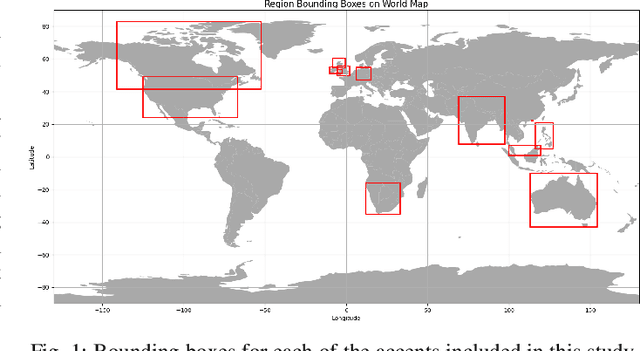
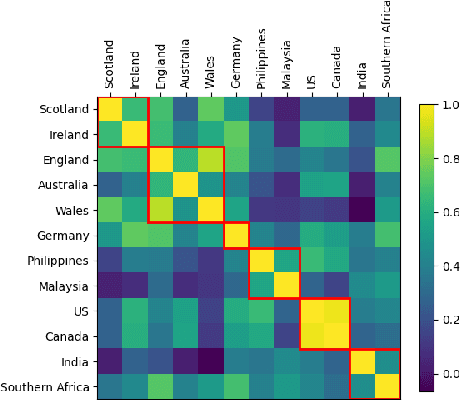
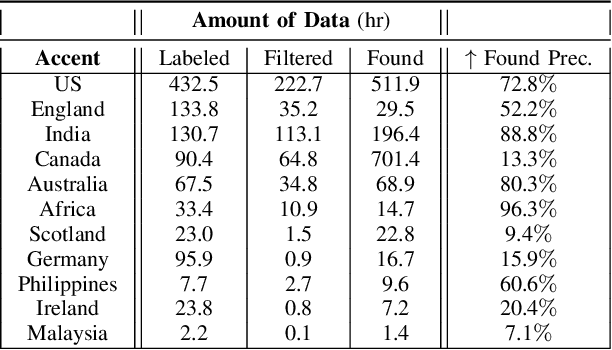

Abstract:We tackle the challenge of scaling accented TTS systems, expanding their capabilities to include much larger amounts of training data and a wider variety of accent labels, even for accents that are poorly represented or unlabeled in traditional TTS datasets. To achieve this, we employ two strategies: 1. Accent label discovery via a speech geolocation model, which automatically infers accent labels from raw speech data without relying solely on human annotation; 2. Timbre augmentation through kNN voice conversion to increase data diversity and model robustness. These strategies are validated on CommonVoice, where we fine-tune XTTS-v2 for accented TTS with accent labels discovered or enhanced using geolocation. We demonstrate that the resulting accented TTS model not only outperforms XTTS-v2 fine-tuned on self-reported accent labels in CommonVoice, but also existing accented TTS benchmarks.
Less is More for Synthetic Speech Detection in the Wild
Feb 08, 2025



Abstract:Driven by advances in self-supervised learning for speech, state-of-the-art synthetic speech detectors have achieved low error rates on popular benchmarks such as ASVspoof. However, prior benchmarks do not address the wide range of real-world variability in speech. Are reported error rates realistic in real-world conditions? To assess detector failure modes and robustness under controlled distribution shifts, we introduce ShiftySpeech, a benchmark with more than 3000 hours of synthetic speech from 7 domains, 6 TTS systems, 12 vocoders, and 3 languages. We found that all distribution shifts degraded model performance, and contrary to prior findings, training on more vocoders, speakers, or with data augmentation did not guarantee better generalization. In fact, we found that training on less diverse data resulted in better generalization, and that a detector fit using samples from a single carefully selected vocoder and a single speaker achieved state-of-the-art results on the challenging In-the-Wild benchmark.
GenVC: Self-Supervised Zero-Shot Voice Conversion
Feb 06, 2025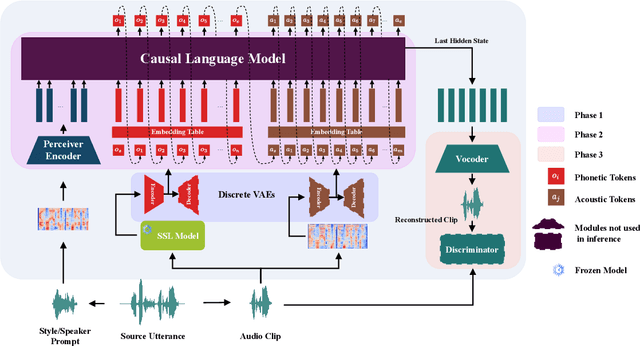

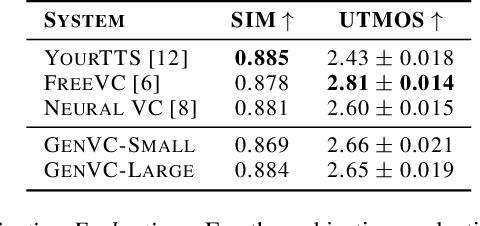
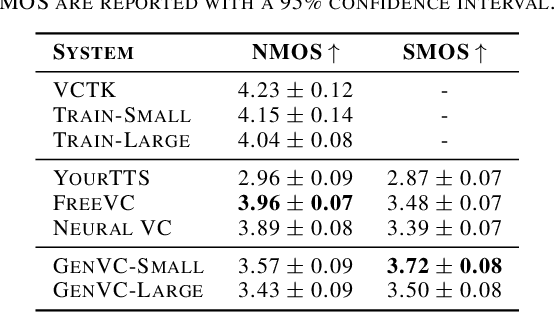
Abstract:Zero-shot voice conversion has recently made substantial progress, but many models still depend on external supervised systems to disentangle speaker identity and linguistic content. Furthermore, current methods often use parallel conversion, where the converted speech inherits the source utterance's temporal structure, restricting speaker similarity and privacy. To overcome these limitations, we introduce GenVC, a generative zero-shot voice conversion model. GenVC learns to disentangle linguistic content and speaker style in a self-supervised manner, eliminating the need for external models and enabling efficient training on large, unlabeled datasets. Experimental results show that GenVC achieves state-of-the-art speaker similarity while maintaining naturalness competitive with leading approaches. Its autoregressive generation also allows the converted speech to deviate from the source utterance's temporal structure. This feature makes GenVC highly effective for voice anonymization, as it minimizes the preservation of source prosody and speaker characteristics, enhancing privacy protection.
HLTCOE JHU Submission to the Voice Privacy Challenge 2024
Sep 17, 2024



Abstract:We present a number of systems for the Voice Privacy Challenge, including voice conversion based systems such as the kNN-VC method and the WavLM voice Conversion method, and text-to-speech (TTS) based systems including Whisper-VITS. We found that while voice conversion systems better preserve emotional content, they struggle to conceal speaker identity in semi-white-box attack scenarios; conversely, TTS methods perform better at anonymization and worse at emotion preservation. Finally, we propose a random admixture system which seeks to balance out the strengths and weaknesses of the two category of systems, achieving a strong EER of over 40% while maintaining UAR at a respectable 47%.
Privacy versus Emotion Preservation Trade-offs in Emotion-Preserving Speaker Anonymization
Sep 05, 2024Abstract:Advances in speech technology now allow unprecedented access to personally identifiable information through speech. To protect such information, the differential privacy field has explored ways to anonymize speech while preserving its utility, including linguistic and paralinguistic aspects. However, anonymizing speech while maintaining emotional state remains challenging. We explore this problem in the context of the VoicePrivacy 2024 challenge. Specifically, we developed various speaker anonymization pipelines and find that approaches either excel at anonymization or preserving emotion state, but not both simultaneously. Achieving both would require an in-domain emotion recognizer. Additionally, we found that it is feasible to train a semi-effective speaker verification system using only emotion representations, demonstrating the challenge of separating these two modalities.
Kreyòl-MT: Building MT for Latin American, Caribbean and Colonial African Creole Languages
May 08, 2024



Abstract:A majority of language technologies are tailored for a small number of high-resource languages, while relatively many low-resource languages are neglected. One such group, Creole languages, have long been marginalized in academic study, though their speakers could benefit from machine translation (MT). These languages are predominantly used in much of Latin America, Africa and the Caribbean. We present the largest cumulative dataset to date for Creole language MT, including 14.5M unique Creole sentences with parallel translations -- 11.6M of which we release publicly, and the largest bitexts gathered to date for 41 languages -- the first ever for 21. In addition, we provide MT models supporting all 41 Creole languages in 172 translation directions. Given our diverse dataset, we produce a model for Creole language MT exposed to more genre diversity than ever before, which outperforms a genre-specific Creole MT model on its own benchmark for 23 of 34 translation directions.
 Add to Chrome
Add to Chrome Add to Firefox
Add to Firefox Add to Edge
Add to Edge